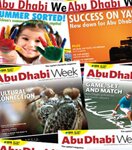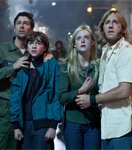The congested freeway that links Abu Dhabi with Dubai is just a few kilometres away, but it might as well be on the other side of Arabia. The coastal reserve run there by Emirates Marine Environmental Group may be close to the industrial developments of Jebel Ali on the border, but it’s hard to believe the two extremes are in such proximity

The environment has borne the brunt of the UAE’s rapid development – not just on land, but also into the sea. This is where EMEG finds its purpose; its core objectives are to preserve biodiversity and fragile ecosystems, protect endangered wildlife, actively participate in conservation efforts, advance research and promote education.
EMEG was established in 1996 as the first marine environmental agency in the UAE. The organisation is staffed by a team that includes marine biologists, wildlife experts, water quality analysts, and professional and commercial divers.
Project manager Houda Dafir explains that the group patrols coastlines in Abu Dhabi, Sharjah and Dubai to carry out environmental monitoring projects and assess the threat of illegal activities, such as poaching. Turtles are a specialty: “throughout the season we have patrolling teams who check on the beaches twice a day and we translocate nests to safer areas in the Reserve. If we are present while the turtle is nesting we take measurements and collect data; and when the eggs hatch, we gather our staff and collect data on hatchlings and release them safely in the Reserve.”
 EMEG also conducts coral monitoring and bird-counts, and compiles wildlife and water quality databases for all the projects it’s involved in. Research is a critical area for EMEG – as Houda says, one of the issues in Abu Dhabi is a lack of all-inclusive data. She notes that there have been sporadic studies which have left gaps that need to be covered in order to identify what action needs to be taken.
EMEG also conducts coral monitoring and bird-counts, and compiles wildlife and water quality databases for all the projects it’s involved in. Research is a critical area for EMEG – as Houda says, one of the issues in Abu Dhabi is a lack of all-inclusive data. She notes that there have been sporadic studies which have left gaps that need to be covered in order to identify what action needs to be taken.
There’s a good deal of collaboration with Abu Dhabi’s Tourism Development and Investment Company, one of the Emirate’s major developers. “We are working toward a turtle monitoring and nesting programme with TDIC,” says Houda Dafir. “It has not been finalised yet, but is in the pipeline.”
EMEG is also involved in waste management consultancy, lending its expertise on schemes that minimise effects on the natural ecosystems and especially the breeding patterns of animals in the area. “We patrol the coast and send feedback to TDIC’s environmental department,”Houda explains.
 But is there too much coastal development? Houda chooses her words with care: “Abu Dhabi has a steady, careful pace of development that allows the environment to recover as it goes along. There is an impact, but the next best option is to mitigate these effects as the economic benefits [of the developments] cannot be ignored.”
But is there too much coastal development? Houda chooses her words with care: “Abu Dhabi has a steady, careful pace of development that allows the environment to recover as it goes along. There is an impact, but the next best option is to mitigate these effects as the economic benefits [of the developments] cannot be ignored.”
Education is at the core of EMEG’s work. “Through educational projects we want to reach out to the younger generation. We are very passionate about our educational programme”, says Houda.
“Most children just see this on TV and now they will see the real thing which is more important,” says EMEG president Ali Saqar Al Suweidi. He thinks children in the UAE risk growing up in a ‘theme park’ environment where shopping malls and video games take the place of simply playing outdoors. “There are no places for children to connect with nature.”
EMEG wants to provide that, and to give children the knowledge that will make them appreciate the value of the natural resources in their native country. This philosophy is refreshingly detached from the superficiality and culture of excess that has permeated so much of the UAE.
 “I want to teach children in the Emirates that a man is not rich because of his money or his car, but rather because of his knowledge,” Ali says. He sees real value in the younger generation understanding their ancestors’ historical attachment to water and nature.
“I want to teach children in the Emirates that a man is not rich because of his money or his car, but rather because of his knowledge,” Ali says. He sees real value in the younger generation understanding their ancestors’ historical attachment to water and nature.
“When the oil finishes, what will you do? If we don’t care and think about the environment we will lose it. Younger generations need to know how their grandfathers and fathers lived in the UAE – it is very important and when the children learn about it, they love it.”
To become a member of EMEG simply fill out the online form.
Contact: www.emeg.ae, email
This e-mail address is being protected from spambots. You need JavaScript enabled to view it
or call 04 363 0561.
Olivia Spadavecchia





